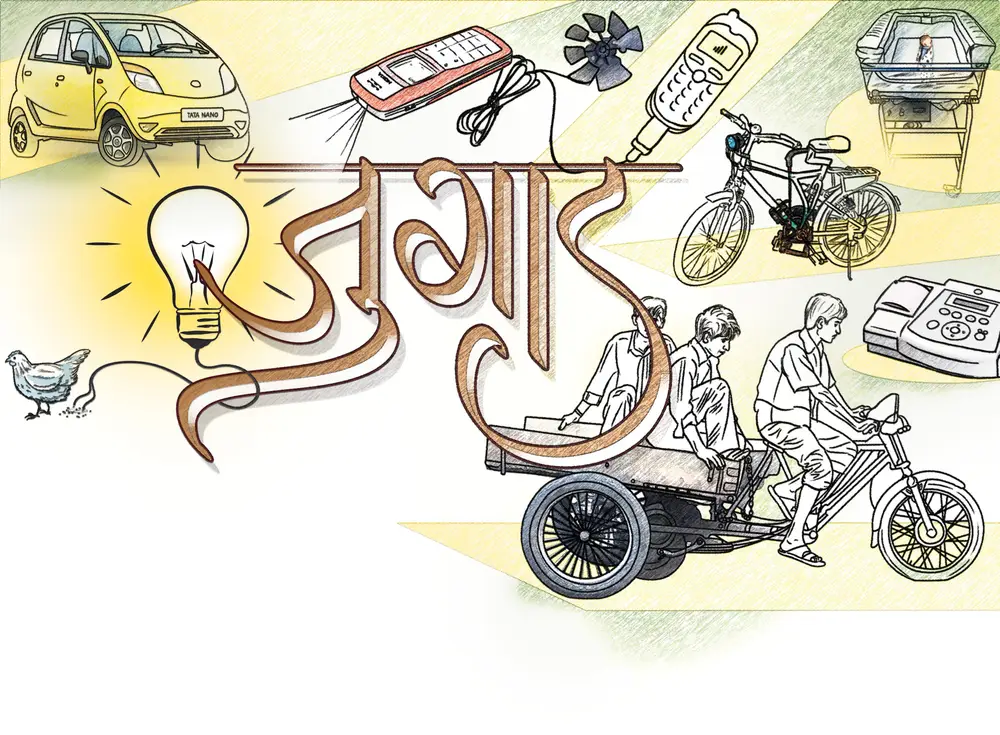If you’ve ever tried —and I mean really tried— to get anything done in an Indian government office, you already know the unspoken truth: our bureaucracy has its own physics. It is a parallel universe where time slows to a halt, people line up endlessly, and the most advanced technology is still the ballpoint pen with its cap chewed off. God may exist in heaven, but in a dimly lit government office between 10 a.m. tea breaks and 3 p.m. chai-samosa, one humble clerk controls the fate of your ration card, electricity connection, or property registration. The only strategy that works is Jalebi or Jugaad.
Now, the question arises almost philosophically, the way Plato might have asked about justice or Aristotle about virtue: when you face this all-powerful babu, should you go the Jalebi route or the Jugaad route?
That, my friends, is the eternally sticky dilemma of Indian civic life.
The Origin of the Jalebi Culture
In the noble decades of the 80s and 90s, when computers were as rare in government offices as UFO sightings, the Jalebi was the gold standard currency of bureaucratic lubrication. If you wanted your file to move, you didn’t push it with words—you sweetened it with a neatly wrapped box of Haldiram’s.
There was something poetic about it, really. Imagine a harassed citizen saying, “Sir, my grandmother is blind, my electricity has been disconnected, and my cow is refusing to give milk—please help!” And the officer, with a slow dignified nod, would glance at the accompanying orange box of fresh jalebis placed subtly on the table, and suddenly his heart would melt faster than ghee on a hot paratha. The gears of governance moved not on signatures or stamps, but on glucose syrup and deep-fried spirals of sugar.

We citizens, of course, had developed an entire informal etiquette about this. You never said “Here, eat this bribe.” No. You respectfully called it “Mithai for the family, Sir! I was just passing by, thought of you.” It was cultural lubrication disguised as the spirit of generosity.
But times have changed. Jalebis have lost their official currency status, and CCTV cameras glare down at us like nosy grandparents. Officers nowadays don’t touch mithai the way they once did, fearing RTI activists or some over-enthusiastic nephew recording on his iPhone.
And thus, my friends, the age of Jalebi diplomacy has been replaced by the age of Jugaad.
Enter Jugaad: The Modern Art of Persuasion
Jugaad, for the uninitiated, is India’s greatest contribution to human civilization after zero and Bollywood wedding songs. It is not bribery; it is creativity. Not corruption; innovation. It is a fine cocktail of persuasion, networking, jugaadu flattery, and a touch of melodramatic theatre.

You see, when direct Jalebi handovers stopped working, we Indians evolved. We developed new tricks:
- “My uncle knows your cousin, Sir. We are practically family.”
- “Sir, my file is crying in the corner for months now, very emotionally sensitive file, please.”
- “Sir, I also did NCC in college, like you. Jai Hind!”
- “Sir, may I fetch chai for you? Special cutting?”
The genius of Jugaad lies in its adaptability. Where Jalebi was calorific but limited, Jugaad is infinite. It bends, twists, pirouettes like a Bollywood extra, slipping into whatever disguise is required: flattery, sympathy, kinship, or melodrama.
So when faced with the great existential question—“Jalebi or Jugaad?”—the seasoned citizen knows the answer: Why choose? Employ both, in proportional harmony! Flatter the officer with words and remind him of his human fondness for sweets. Sprinkle some tears on top for pathos. That is how true masters of paperwork survive.
The Hero’s Journey: My Attempt to Get a Domicile Certificate
Allow me to illustrate with my personal tale of bureaucratic adventure. It started innocently: I decided to get a domicile certificate. How hard could it be, right? Fill a form, submit documents, voilà!
Wrong.
The office resembled a battlefield. Dozens of citizens waved papers at counters like surrender flags, clerks moved slower than glaciers, and a peon shouted, “Aaj system down hai!” with the authority of Moses declaring plagues in Egypt. I calculated quickly: asking politely was like bringing a knife to a gunfight. This required theatrics.
I approached the officer. Let’s call him Mr. Desk Devta. His spectacles hung precariously on his nose, his pen was poised but unmoving, and his eyes suggested 40 years of service had prepared him for exactly one activity: saying “Kal aana.”
Here was my moment of truth. Jalebi or Jugaad?
Act 1: Deploy the Jalebi Strategy
With a trembling but confident hand, I placed a small box of fresh jalebis on his desk, carefully wrapped in innocent brown paper.
“Sir,” I said softly, voice dripping with respect thicker than rabdi. “Just some mithai… my daughter insisted I should share with our most respected officer. How can I go home without offering you?”
He looked at the box. Time slowed. Did I cross the line? Was he the incorruptible type? Was my file about to be buried in eternal pending status?
Then came the subtle signal—a small smile, the kind of smile Indian officers reserve for when they remember their first salary day. The Jalebi strategy had cracked open the fortress wall, if only slightly.
Act 2: Escalate to Jugaad
But jalebi alone was not enough. The next stage required storytelling.
“Sir,” I began, shifting my voice into tragic-soap-opera mode, “My poor grandmother, 87 years old, has been waiting anxiously. Every day she asks me, ‘Beta, where is the certificate?’ She can hardly climb stairs, sir… but her last wish, before God calls her, is to see this certificate framed in our house. Don’t break her heart, Sir.”
Now, I don’t even have an 87-year-old grandmother. But in that moment, in that office, she existed—fragile, emotional, with cataracts and trembling hands. Even Shah Rukh Khan would’ve applauded.
Desk Devta’s eyes narrowed, pen tapping. He asked for my form. He read it with surprising diligence—(a side effect of playing god, no doubt).
Act 3: The Flattery Crescendo
I leaned in closer. “Sir, I must say, I’ve never seen handwriting as clear as yours. The way your signature flows—it’s like calligraphy. I wish my students could learn this penmanship.”
For 40 years this man had signed forms. Nobody had ever complimented his penmanship. His back straightened. Chest swelled. Suddenly, I wasn’t some desperate applicant—I was an appreciator of fine bureaucratic artistry.
And then, with a grunt that was half annoyance, half hidden pleasure, he stamped my form. BAM!
Ladies and gentlemen, Jalebi plus Jugaad had triumphed.

Field Guide to Surviving Government Offices
Having survived, I now consider it my civic duty to share practical survival tips for the next generation of citizens.
1. Timing is Everything
Never approach an officer before his morning chai. You might as well be talking to a stone pillar. Post-lunch, however, is risky due to digestive drowsiness. Aim for the golden slot: 11:15 a.m.
2. The Jalebi Protocol
- Always go for fresh sweets. Stale jalebis are an insult worse than paperwork errors.
- Do not bring fancy chocolates; it makes you look insincere and NRI-ish. Stick to mithai classics.
3. The Jugaad Arsenal
- Kinship Trick: “Sir, you remind me of my elder brother.”
- Sympathy Trick: “Sir, please, my file is weeping more than a hero in Ekta Kapoor serial.”
- Flattery Trick: “Sir, there is nobody who manages this chaos with such calm dignity as you.”
4. Never Underestimate Theatre
If all else fails, collapse dramatically in despair. Mutter “Bas Bhagwan hi hai malik” with moist eyes. At minimum, you will attract sympathy; at best, files will fly.
Jalebi vs. Jugaad: The Eternal Debate
Let us pause for serious philosophical inquiry. Which is superior?
| Jalebi | Jugaad |
|---|---|
| Tangible, edible, immediate impact | Flexible, adaptable, works in any scenario |
| Risky in CCTV era | Safer under modern scrutiny |
| Evokes nostalgia of 80s-90s | Represents evolution and creativity |
| Sugar high included | Ego massage included |
The truth, however, is neither alone suffices. The 21st-century citizen must blend them. Think of it as a cocktail: one part sugar, two parts flattery, shaken with melodrama, garnished with despair. Sip, repeat, survive.
Epilogue: Reflections from the Queue
As I finally left the office, certificate in hand, I felt like a war hero clutching his medal. Around me, fresh recruits were still battling, files waving like tattered flags. One whispered, “Bhaiya, how did you do it so quickly?”
I leaned in solemnly, whispered two words: “Jalebi or Jugaad.”
And so, dear reader, remember this gospel as you navigate the holy corridors of Indian bureaucracy. God might run the universe, but here on Earth, in the waiting rooms of dusty government buildings, it is the delicate balance of Jalebi and Jugaad that decides destiny.





0 Comments